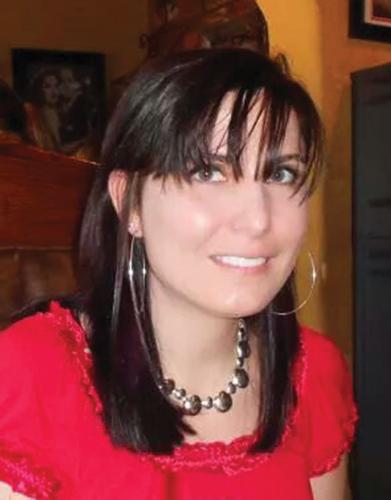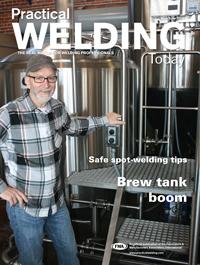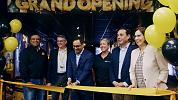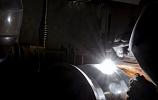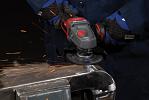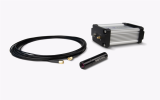- FMA
- The Fabricator
- FABTECH
- Canadian Metalworking
Categories
- Additive Manufacturing
- Aluminum Welding
- Arc Welding
- Assembly and Joining
- Automation and Robotics
- Bending and Forming
- Consumables
- Cutting and Weld Prep
- Electric Vehicles
- En Español
- Finishing
- Hydroforming
- Laser Cutting
- Laser Welding
- Machining
- Manufacturing Software
- Materials Handling
- Metals/Materials
- Oxyfuel Cutting
- Plasma Cutting
- Power Tools
- Punching and Other Holemaking
- Roll Forming
- Safety
- Sawing
- Shearing
- Shop Management
- Testing and Measuring
- Tube and Pipe Fabrication
- Tube and Pipe Production
- Waterjet Cutting
Industry Directory
Webcasts
Podcasts
FAB 40
Advertise
Subscribe
Account Login
Search
Courage over fear
Alabama woman finds home, fulfillment in welding career
- By Amanda Carlson
- May 26, 2014
- Article
- Arc Welding
As a child, Sarah Al-Khatab was told over and over again that a pretty girl should find a good man to take care of her. It never did make much sense to her, even when she was too young to understand why. As she got older, Al-Khatab was uncomfortable with the thought of relying on someone else for financial support or otherwise. In fact, she wanted control of her own destiny and to be able to provide for herself.
After trying her hand at various traditionally female-oriented careers, she took a chance at a local shipyard as a welder. Though it was difficult at times, this decision ultimately sparked a chain of events that led her to Austal, a company in Mobile, Ala., that designs, fabricates, and maintains littoral combat ships (LCS) and joint high speed vessels (JHSV) for the U.S. Navy as well as commercial vessels.
Today, instead of being stuck in a job that doesn’t pay well or leaves her feeling empty, Al-Khatab has worked her way up to welding training supervisor at Austal, a job that she loves and one that gives her the ability to provide for family.
PWT: What led you to the welding profession?
Al-Khatab: Ever since I was young I was always told that I needed to find a good man to take care of me so I would never have to lift a finger. I would think to myself, “You know, I don’t know if I want that.” I have friends today who are with a man only because they feel crippled because they can’t provide for themselves.
I met a man and I thought I was in love and I got pregnant. I started to get scared because this man had a lot of unhealthy habits and I knew that he would not provide a good environment for my child.
After my son came—my brother lived with me at the time—I had it in the back of my mind to try getting into the shipbuilding industry. My brother was in the shipbuilding business, my dad was a welder, and my brothers had all been welders and fitters, so this wasn’t a new idea to me. Meanwhile, I was working in the floral department at a grocery store, which I liked, but they don’t pay enough to support a child. Plus, I felt empty inside. I’d watch my brother go to work for 8 to 10 hours a day—which was miniscule compared to the hours I had to work —and bring home a check that was triple what I was making.
PWT: What was your breaking point?
Al-Khatab: My son. I’ll tell you what, my son is worth me going there and doing those kinds of things. I decided that instead of finding a man, why not just go and take his job. I’ll take the job that everyone trained me to believe would support me one day.
So I washed my face, pulled my hair back, and put on a do-rag for the first time ever. When I walked into this shipyard I explained to them that I had never welded anything, I had never fit anything, or been in that kind of an environment before. But I told them that if they gave me a chance to prove myself, they would not be disappointed. So they did. They put me at a place called Bender shipyard, a structural repair shipyard that was here at the time and gave me a job.
PWT: How did your friends and family react?
Al-Khatab: My brother was extremely upset when he found out. He told me, “It’s all right, baby sis, you won’t make it anyway,” and he patted me on my head. When he did that, right then and there a fire lit within me and I told myself that I would not fail.
I went to work every day, and those guys at that shipyard threw absolutely everything at me. Track burning, arc gouging, plasma cutting, welding stainless steel. Then they gave me the certification test for a fillet weld on flux-core arc welding, and I passed.
Finally they put me out in the yard next to my brother and we’d sit and eat lunch together every day. I was at that yard for about a year when I saw them building Austal from across the river. For some reason I felt the pull to get over there and find out what was happening.
PWT: How did you finally end up at Austal?
Al-Khatab: My brother had gone to work over at Austal and had told me how fantastic it was and how they care about their employees. To top it off, they were paying twice as much as what I was already making, so I applied. At that point I had some welding background so I felt like I had an advantage compared to my first job. They hired me, and when I walked in the shipyard and saw the differences there, I knew it was where I belonged and that I’d never leave the company.
After about a year at Austal I got pregnant with my second child. I continued working until I physically just couldn’t anymore. When I put in for a leave, they told me that they couldn’t guarantee that I’d have a position when I came back, so I said I’d come back and take whatever they had because my priority at that time was taking care of my child.
Six weeks after I had my child, I walked back into Austal and they gave me my job back as a B-Class welder. They began pushing me to certify on other things and pushing me into different areas. I got qualified on my NVR [Naval Vessel Regulations] Group 2, which is a butt joint on aluminum. I became an A-Class welder and started welding the seams on the flight deck of the LCS 1, which was our first military contracted vessel. It was an honor to be put on that project. And they didn’t put a crew of us on it, they put me there by myself to weld the whole thing.
PWT: How did you end up as supervisor of the training department?
Al-Khatab: Apparently they had been watching me—the U.S. Navy and Austal’s head supervisors. They said that what I was doing was what they wanted everyone else to do, so they asked that I be put in the training department to teach the rest of the company what I was doing. Basically, I was handpicked by the Navy for this position. I was flabbergasted.
When I got promoted to supervisor, I had to train my instructors to what tools and knowledge and experience these new welders needed to have to be successful at the company.
The instructors and I put welders through an orientation that shows them what we do and communicates to them that people’s lives are at stake with the work that we do. It shows some of the hazards and the various ways that people try to cut corners. We want to let them know from the very beginning that everything they do has to be done right the first time. We have people’s lives in our hands. This is a big deal that relates to national security. We’re not building handrails for commercial vessels.
PWT: What’s on your plate right at this very moment?
Al-Khatab: I’m designing curriculums for workforce development for Alabama Industrial Development Training. It’s like a college course for welding funded by the state. I do that along with writing the weld procedures and trying to keep weld quality at the forefront here at Austal.
PWT: What do you hope to accomplish by sharing your personal story with readers?
Al-Khatab: Out of all of the places that I have worked in the past, this is the place that I was looking for. To get here, all I had to do was push away that fear of entering what is typically viewed as a man’s environment. Not enough girls are taught that they can be welders, fitters, or electricians even. I was taught from the beginning that I needed to find a good man to take care of me, and
I know a lot of other girls were taught the same and probably still are today.
It’s been a journey. In the beginning I was scared, but now I feel like I’m home. There are women out there that feel trapped because they are fully dependent upon a man and are scared to leave. I have a friend going through that right now. She tells me she wishes she had the courage to enter this field, and I tell her, “You can! There’s nothing stopping you but you.”
If my story reaches a young lady and it opens up her eyes to what’s possible and lets her know that she doesn’t have to feel stuck in some situation she doesn’t want to be in, then it’s worth it.
About the Author

Amanda Carlson
2135 Point Blvd
Elgin, IL 60123
815-227-8260
Amanda Carlson was named as the editor for The WELDER in January 2017. She is responsible for coordinating and writing or editing all of the magazine’s editorial content. Before joining The WELDER, Amanda was a news editor for two years, coordinating and editing all product and industry news items for several publications and thefabricator.com.
About the Publication
subscribe now
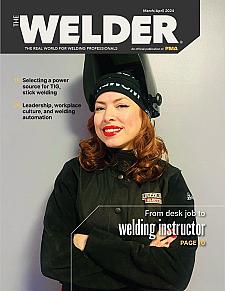
The Welder, formerly known as Practical Welding Today, is a showcase of the real people who make the products we use and work with every day. This magazine has served the welding community in North America well for more than 20 years.
start your free subscription- Stay connected from anywhere

Easily access valuable industry resources now with full access to the digital edition of The Fabricator.

Easily access valuable industry resources now with full access to the digital edition of The Welder.

Easily access valuable industry resources now with full access to the digital edition of The Tube and Pipe Journal.
- Podcasting
- Podcast:
- The Fabricator Podcast
- Published:
- 04/16/2024
- Running Time:
- 63:29
In this episode of The Fabricator Podcast, Caleb Chamberlain, co-founder and CEO of OSH Cut, discusses his company’s...
- Industry Events
16th Annual Safety Conference
- April 30 - May 1, 2024
- Elgin,
Pipe and Tube Conference
- May 21 - 22, 2024
- Omaha, NE
World-Class Roll Forming Workshop
- June 5 - 6, 2024
- Louisville, KY
Advanced Laser Application Workshop
- June 25 - 27, 2024
- Novi, MI
























